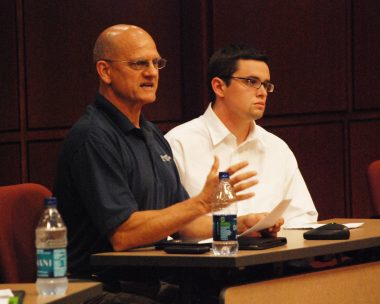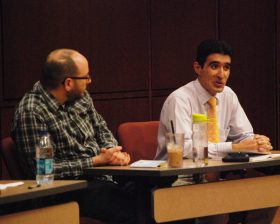What does the future hold for the United States now that Osama bin Laden is dead? And why did Americans feel the need to celebrate someone’s death? A panel of faculty and students addressed those questions and more on May 9 in a community discussion sponsored by the Truitt Center for Religious and Spiritual Life.

Moderated by associate chaplain Phil Smith, the panel – four professors and two students, including a freshman from Afghanistan – reflected for 90 minutes in the LaRose Digital Theatre on the May 1 military operation in Pakistan that resulted in the shooting of the man responsible for the largest terrorist attack ever to take place on American soil.
Panelists included:
Tom Arcaro, Sociology
Stephen Bloch-Schulman, Philosophy
Stephen Thompson, Military Science
Safia Swimelar, Political Science
Students Toorialey Fazly ’14 and Andrew Black ‘11
“The killing of Osama bin Laden represents a huge victory for the United States and Afghanistan,” Fazly said. “His death is not only a victory for the American people, but for freedom loving people around the world.”
Not all panelists expressed approval at the way Americans have reacted to the death. Citing data from UNICEF, Arcaro noted how 22,000 children under the age of 5 die of preventable causes every day, yet the death of one man is what has captivated American television. While he understands this – after all, he explained, Americans have built a narrative around bin Laden and the Sept. 11 attacks – it’s disheartening to see the jubilee that appeared on the front pages of newspapers the morning after President Barack Obama’s address to the nation.
“I looked at The Pendulum not with a great deal of pride,” he said of the Elon student newspaper’s coverage of spontaneous street demonstrations. “That wasn’t the best of Elon, in that the death of somebody – the violent death of somebody – was being celebrated.”
Bloch-Schulman added his own concerns. He put forward the notion that Americans have no way to know how the rest of the world may react to the celebrations – and based on those reactions, Americans may regret their own boisterous behavior.

“When we celebrate here, the world is watching,” he said. “It’s not like we do it and the Internet and Facebook doesn’t know what’s going on. And it’s not to say we shouldn’t celebrate – it’s to say there are potential, real consequences to the way the world sees us, and how it sees us looking at them.”
Black spoke in support of the student celebrations. He was among the revelers.
“I know exactly why I participated. I was rejoicing,” said the native of northern Virginia who saw firsthand the damage to the Pentagon because of the attacks. “I really do appreciate the big picture here, but we also have to bring it back down to why are so many people feeling these same emotions, all around the world?”
Many questions from the audience of more than 50 people focused on the geopolitical implications arising from the way Navy SEALs conducted the raid. Though successful, the intrusion by ground forces has reopened a lingering wound to Pakistan’s national pride.
“It’s difficult for the people of Pakistan because they’ve been very upset at the continued drone attacks and the continued violation of its sovereignty,” Swimelar said. “I don’t think anyone would like to see the next revolution in that part of the world happen in Pakistan.”
As for the future of America’s military involvement in southwest Asia?
“That decision is going to be based in a large measure on how comfortable our allies are handling their own security, and what our commanders on the ground are saying,” Thompson said. “It could be devastating to pull out too early.”


